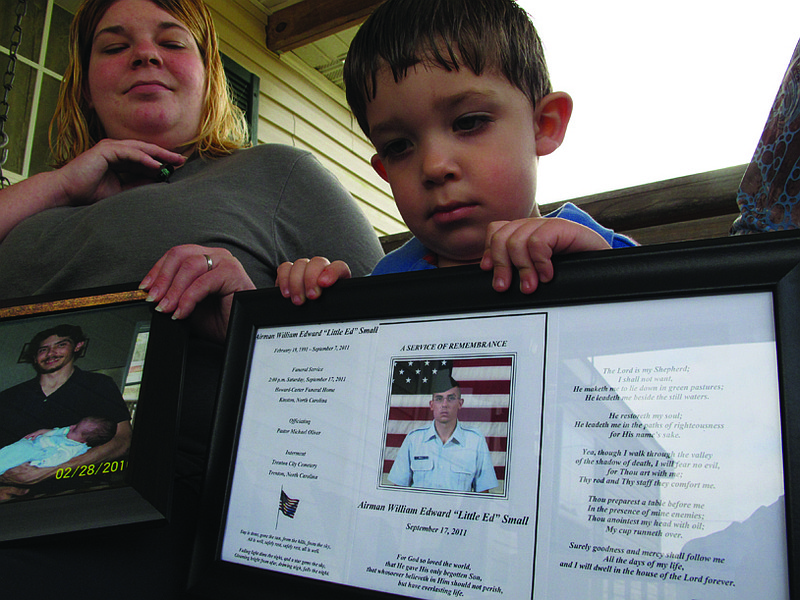RALEIGH, N.C. (AP) - A North Carolina woman said Monday she wasn't surprised to learn that her child's father was the Air Force aviation mechanic whose rabies-infected organs were transplanted into other recipients, including a Maryland man who died.
Alecia Mercer, 20, of Trenton, N.C., told The Associated Press that she was dubious when the military told her that William Edward Small died of a stomach virus in September 2011 while training in Florida. But she said military officials assured her that was the cause.
"He did a lot of trapping and hunting and stuff," she said. "He did the trapping, and he didn't care what the animal looked like. He just picked it up."
Military and state health officials visited Mercer last week at her home and told her that Small had died of rabies, Mercer said. At some point in his illness, she was told that he suffered food poisoning from fish. But then she was told he died of complications from a stomach virus, including severe dehydration.
"I was very suspicious over that," she said. "At first they said it was poison from a fish, and he fished a lot. I knew he knew all types of fish. Then it came back it that it was a stomach virus. I just couldn't believe that."
Mercer's mother, Anna Mercer, said she was also suspicious of the cause of death and asked if the family should take any precautions for Small's son. "I accepted it because that was on his death certificate," she said. "But something just didn't set right with me."
Small's sister, Katie Small, said Monday that her family was told he died from fish poisoning that caused inflammation of the brain, seizures, dehydration and blood pressure. She said she and her parents were surprised when they learned last week that rabies caused her brother's death.
Doctors in Florida didn't test the 20-year-old Small for rabies before he died. A man who received an infected kidney died. His heart, liver and other kidney went to recipients in Florida, Georgia and Illinois. They started getting the vaccine this month, and none has had rabies symptoms.
Public health officials in five states have been assessing the rabies risk for hundreds of people who may have had close contact with Small. They say the virus can be spread through the infected person's saliva and mucous membranes, but human-to-human contact is rare.
Small went through basic training in Texas before going to Florida to train as aviation mechanic. He visited a clinic at the Pensacola Naval Air Station in August 2011 for abdominal pain and vomiting and was transferred to a civilian hospital four days later, a Defense Department spokeswoman said last week.
The organs were offered for transplant by LifeQuest Organ Recovery Services of Gainesville, Fla., said Kathy Giery, the group's director of donor program development.
Giery said the hospital's diagnosis at the time of death was that his illness was caused by food poisoning from ciguatera, a toxin sometimes found in large saltwater fish including grouper, red snapper and sea bass. The Defense Department has said the donor died of severe stomach and intestinal inflammation with complications including dehydration and seizure. The Florida Department of Health has said he died of encephalitis - a brain inflammation - of unknown origin.
Giery said the donor wasn't tested for rabies because his symptoms didn't raise a red flag for infection.
"There was no testing done for rabies at any point in the process because nobody suspected rabies," she said.
As the "host organ procurement organization," LifeQuest was responsible for the quality of the organs it offered when it posted their availability on a national database maintained by the United Network for Organ Sharing.
Giery said every donor program does extensive testing of every potential donor, but rabies isn't part of the routine screening, partly because human cases are so rare. It causes just one to three deaths per year in the United States, according to the CDC.
"The symptoms that this individual had were consistent with the diagnosis," she said. "Those conditions were consistent with our ability to pursue donation."
Federal guidelines published last year for evaluating organ donors with encephalitis urge "extreme caution" if the suspected cause is a viral pathogen, such as rabies. Giery said those guidelines weren't in place when the organs were offered in 2011.

